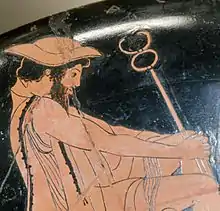petasus
English

Hermes with a petasus.
Alternative forms
Etymology
Borrowed from Latin petasus, and its source, Koine Greek πέτασος (pétasos), from Ancient Greek πεταννύναι (petannúnai, “to spread out”).
Pronunciation
- (UK) IPA(key): /ˈpɛtəsəs/
Noun
petasus (plural petasi)
- (historical) A broad-brimmed, low-crowned hat worn by the Ancient Greeks and Romans, especially for travelling, and as often pictured to be worn by Hermes (or Mercury); (later also) the brimless winged cap worn by Hermes in later artistic depictions. [from 16th c.]
- 1981, Gene Wolfe, chapter XXV, in The Claw of the Conciliator (The Book of the New Sun; 2), New York: Timescape, →ISBN, page 238:
- Their faces were shadowed beneath broad-brimmed, low-crowned petasoses.
Translations
low-crowned hat worn by the Ancient Greeks and Romans
|
Latin
Etymology
Borrowed from Ancient Greek πέτασος (pétasos).
Pronunciation
- (Classical) IPA(key): /ˈpe.ta.sus/, [ˈpɛt̪äs̠ʊs̠]
- (modern Italianate Ecclesiastical) IPA(key): /ˈpe.ta.sus/, [ˈpɛːt̪äs̬us]
Noun
petasus m (genitive petasī); second declension
- a travelling hat or cap with a broad brim
- (architecture) something in the shape of a cap, placed on a building; a cap, cupola
Declension
Second-declension noun.
| Case | Singular | Plural |
|---|---|---|
| Nominative | petasus | petasī |
| Genitive | petasī | petasōrum |
| Dative | petasō | petasīs |
| Accusative | petasum | petasōs |
| Ablative | petasō | petasīs |
| Vocative | petase | petasī |
References
- “petasus”, in Charlton T. Lewis and Charles Short (1879) A Latin Dictionary, Oxford: Clarendon Press
- petasus in Gaffiot, Félix (1934) Dictionnaire illustré latin-français, Hachette.
- “petasus”, in Harry Thurston Peck, editor (1898), Harper's Dictionary of Classical Antiquities, New York: Harper & Brothers
- “petasus”, in William Smith et al., editor (1890), A Dictionary of Greek and Roman Antiquities, London: William Wayte. G. E. Marindin
This article is issued from Wiktionary. The text is licensed under Creative Commons - Attribution - Sharealike. Additional terms may apply for the media files.